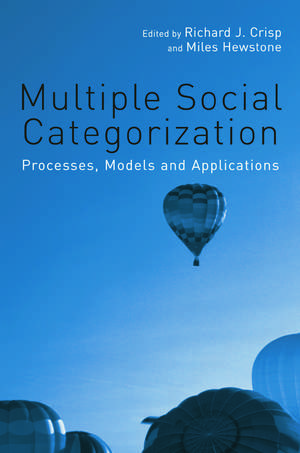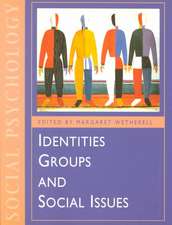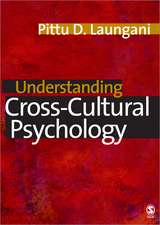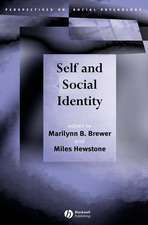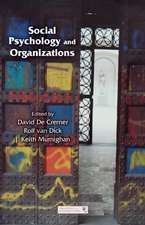Multiple Social Categorization: Processes, Models and Applications
Editat de Richard J. Crisp, Miles Hewstoneen Limba Engleză Paperback – 13 feb 2014
Social categorization, how we classify ourselves and others, exerts a profound influence on our thoughts, beliefs, feelings, and behaviors. In this volume, Richard Crisp and Miles Hewstone bring together a selection of leading figures in the social sciences to focus on a rapidly emerging, but critically important, new question: how, when, and why do people classify others along multiple dimensions of social categorization? The volume also explores what this means for social behavior, and what implications multiple and complex perceptions of category membership might have for reducing prejudice, discrimination, and social exclusion.
Topics covered include:
- the cognitive, motivational, and affective implications of multiple categorization
- the crossed categorization and common ingroup methods of reducing prejudice and intergroup discrimination
- the nature of social categorization among multicultural, multiethnic, and multilingual individuals.
| Toate formatele și edițiile | Preț | Express |
|---|---|---|
| Paperback (1) | 491.21 lei 6-8 săpt. | |
| Taylor & Francis – 13 feb 2014 | 491.21 lei 6-8 săpt. | |
| Hardback (1) | 1061.36 lei 6-8 săpt. | |
| Taylor & Francis – 12 oct 2006 | 1061.36 lei 6-8 săpt. |
Preț: 491.21 lei
Nou
Puncte Express: 737
Preț estimativ în valută:
93.99€ • 98.41$ • 77.96£
93.99€ • 98.41$ • 77.96£
Carte tipărită la comandă
Livrare economică 09-23 aprilie
Preluare comenzi: 021 569.72.76
Specificații
ISBN-13: 9780415655675
ISBN-10: 0415655676
Pagini: 344
Ilustrații: 8 tables and 25 line drawings
Dimensiuni: 156 x 234 x 20 mm
Greutate: 0.5 kg
Ediția:1
Editura: Taylor & Francis
Colecția Psychology Press
Locul publicării:Oxford, United Kingdom
ISBN-10: 0415655676
Pagini: 344
Ilustrații: 8 tables and 25 line drawings
Dimensiuni: 156 x 234 x 20 mm
Greutate: 0.5 kg
Ediția:1
Editura: Taylor & Francis
Colecția Psychology Press
Locul publicării:Oxford, United Kingdom
Cuprins
Part 1. Introduction. R.J. Crisp, M. Hewstone, Multiple social categorization: Context, process, and social consequences. Part 2. Multiple Category Representation. C. McGarthy, Hierarchies and minority groups: The roles of salience, overlap and background knowledge in selecting meaningful social categorizations from multiple alternatives. E.R. Smith, Multiply categorizable social objects: representational models and some potential determinants of category use. Part 3. Multiple Categorization and Social Judgement. J.F. Dovidio, S.L. Gaertner, G. Hodson, B.M. Riek, K.M. Johnson, M. Houlette, Recategorization and crossed categorization: The implications of group salience and representations for reducing bias. R.J. Crisp, Commitment and categorization in common ingroup contexts. M.A. Hogg, M.J. Hornsey, Self-concept threat and multiple categorization within groups. Part 4. Cross-Cutting Categorization and Evaluation. N. Miller, J. Kenworthy, C.J. Canales, D.M. Stenstrom, Explaining the effects of crossed categorization on ethnocentric bias. T.K. Vescio, C.M. Judd, P. Chua, The crossed categorization hypothesis: cognitive mechanisms and patterns of intergroup bias. R. Singh, Gender among multiple social categories: Social attraction in women but interpersonal attraction in men. Part 5. Broader Perspectives. J. Phinney, L.L. Alipuria, Multiple social categorization and identity among among multiracial, multiethnic, and multicultural individuals: Processes and implications. N.A. Carter, Political institutions and multiple social identities. Part 6. Conclusion. M. Hewstone, R. Turner, J. Kenworthy, R.J. Crisp, Multiple social categorization: Future directions.
Notă biografică
Richard Crisp is a Reader in Social Psychology at the University of Birmingham. His research focuses on cognitive, motivational, and affective models of social categorization, group processes, and intergroup relations. He is a past winner of the British Psychology Society’s award for Outstanding Doctoral Research Contribution to Psychology, and the Society for the Psychological Study of Social Issues Louise Kidder Early Career Award for his work on multiple social categorization.
Miles Hewstone is Professor of Social Psychology and Fellow of New College, Oxford. He has published widely on the topics of attribution theory, social cognition, stereotyping, social influence, and intergroup relations. He is co-founding editor of the European Review of Social Psychology, a former editor of the British Journal of Social Psychology and is a past winner of the British Psychology Society’s Spearman Medal and Presidents' Award.
Miles Hewstone is Professor of Social Psychology and Fellow of New College, Oxford. He has published widely on the topics of attribution theory, social cognition, stereotyping, social influence, and intergroup relations. He is co-founding editor of the European Review of Social Psychology, a former editor of the British Journal of Social Psychology and is a past winner of the British Psychology Society’s Spearman Medal and Presidents' Award.
Recenzii
'This book makes a compelling case that multiple categorization is the single most important question in the domain of social categorization. The 12 chapters in the book provide a comprehensive and scholarly review of the important literature in this field.' - Charles Stangor, University of Maryland.
'This book makes a compelling case that multiple categorization is the single most important question in the domain of social categorization. The 12 chapters in the book provide a comprehensive and scholarly review of the important literature in this field.' - Charles Stangor, University of Maryland.
"without hesitation, I recommend that this book should be found on the shelves of any library serving a department in which cognitive science is taken seriously." -PsycCritiques
'This book makes a compelling case that multiple categorization is the single most important question in the domain of social categorization. The 12 chapters in the book provide a comprehensive and scholarly review of the important literature in this field.' - Charles Stangor, University of Maryland.
"without hesitation, I recommend that this book should be found on the shelves of any library serving a department in which cognitive science is taken seriously." -PsycCritiques
Descriere
Multiple Social Categorization: Processes, Models and Applications will be of interest to those studying or researching in social psychology, in particular in the fields of Group Processes and Intergroup Relations.
